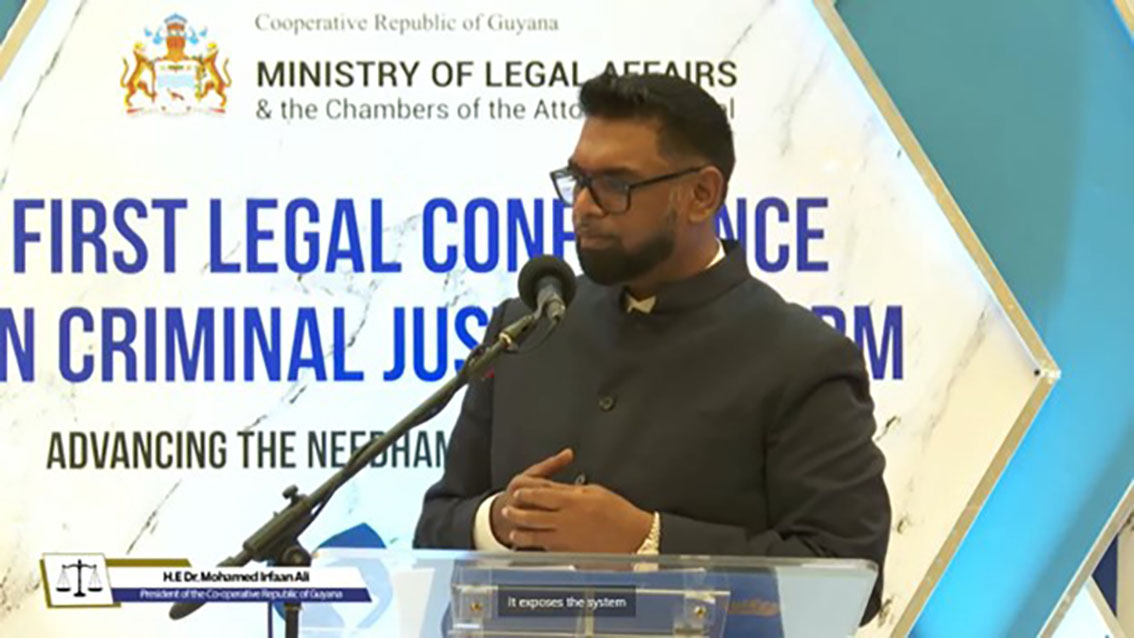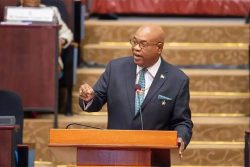-President tells criminal justice reform conference
President Irfaan Ali yesterday underscored that crime does not exist in isolation but is deeply embedded in societal, economic and environmental contexts.
Addressing the First Legal Conference on Criminal Justice Reform – Advancing the Needham’s Point Declaration in Georgetown, he stressed the importance of addressing these underlying issues to effectively tackle crime and ensure sustainable justice outcomes.
Speaking at the Marriott Hotel to an audience that included judges of the Caribbean Court of Justice and the Guyana judiciary, President Ali’s speech underscored the critical need for holistic reforms in the criminal justice system, emphasizing regional cooperation, environmental challenges, and the pivotal role of institutions in shaping societal outcomes.
In his opening remarks, President Ali acknowledged the distinguished audience and highlighted Guyana’s leadership in various domains while drawing attention to pressing environmental challenges. He commended the venue for providing a platform to discuss these critical issues and made note in a diplomatic way of the manner in which the discomfort from the defective air conditioning system within the hotel was akin to the conditions under which men and women of the past functioned.
As members of the audience fanned themselves, President Ali delved into the historical context of societal and environmental changes, emphasizing their profound impact on human behaviour and societal structures. He drew a parallel between these changes and their influence on the criminal justice system, urging a comprehensive examination of these interconnected dynamics.
Reflecting on the conference’s significance, President Ali praised the Chief Justice of Belize, Louise Blenman for moving beyond traditional conference declarations and emphasized the need for sustained dialogue and actionable outcomes.
Political stability, the rule of law, and democracy were highlighted as foundational pillars crucial for an effective criminal justice system. President Ali noted that instability and weak governance can exacerbate criminal activities.
The President introduced the concept of judicial predictability, advocating for consistent and fair judicial decisions across the region. He emphasized the role of quality lawyers and judges supported by a modern legislative framework in ensuring justice and fairness.
The accelerating pace of digitization and technological advancements in the judiciary were also central to President Ali’s address. He highlighted the need for continuous education and specialized training for judges and lawyers to navigate emerging challenges such as Artificial Intelligence-generated content and digital evidence.
Turning to regional challenges, President Ali cited alarming statistics on crime rates in Caribbean Commonwealth states, emphasizing the urgent need for collective regional action. He underscored the interconnectedness of economic challenges, climate change impacts, and developmental disparities, calling for integrated policies to mitigate these factors’ contribution to crime.
He urged a reevaluation of traditional approaches to crime prevention, advocating for comprehensive strategies that encompass education, infrastructure development, and community engagement. He emphasized the role of strong institutions in fostering stability and resilience against external shocks such as natural disasters and economic disruptions.
Ali called for greater regional cooperation, enhanced networking among legal professionals, and strategic alignment with international treaties and charters. He stressed the role of non-governmental organisations and international organisations in shaping regional policies and fostering collaborative solutions.
After the long absence of a Judicial Service Commission (JSC) here, the new JSC has selected nine new magistrates and 10 high court judges and is in the process of supplementing the number of judges on the Court of Appeal which should see a reduction in the backlog of cases and the speeding up of hearings. The President has however not acted on the confirmation of a Chief Justice and Chancellor of the Judiciary nearly four years into his term.









